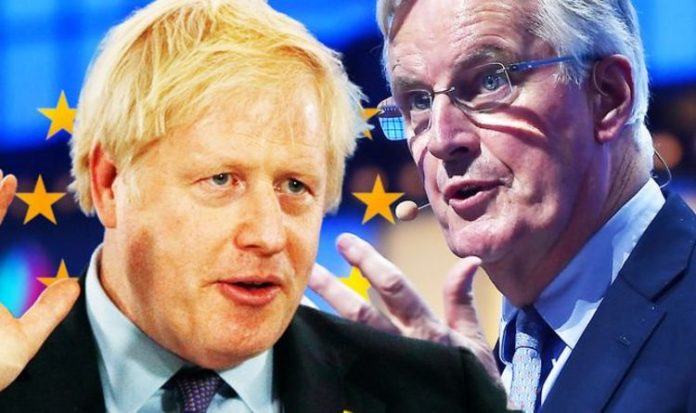The huge divorce bill has been accepted by the UK despite Prime Minister Boris Johnson’s resistance and Brexiteer fury. Mr Johnson warned last August that in the event of a no deal, the hefty fee would “not strictly” be owed to Brussels. He said: “If we come out without an agreement it is certainly true that the £39billion is no longer, strictly speaking, owed.” However, given the UK has now accepted that it will pay per the financial settlement – refusal to now could provoke the EU to take the case to the International Court of Justice. Much to the dismay of leavers in the UK, the divorce bill could still be being paid off by 2060, according to the Office for Budget Responsibility. The OBR estimated in January that the bill stood at just under £30billion – most of this to be paid by 2022, with some relatively small payments still being made until the 2060s. However, clauses in the UK’s withdrawal agreement with the EU threatens to pile on further costs.
The OBR figure of £33billion for the divorce bill is not an absolute number – more of an estimate.
But on top of this, there are future liabilities in the small print of the withdrawal agreement which could lead to yet more disputes between Brussels and London.
The UK’s future liabilities covers 50 pages of the agreement, and outlines that different parts of the EU have made long-dated loans or financial commitments during the UK’s time in the bloc.
The agreement, which was passed by Parliament and settled on by both the UK and the EU, saddles Britain with a responsibility to pay for a portion of any future losses on those loans and financial commitments, regardless of whether any benefit was reaped from them.
One caveat is that this only applies to loans and commitments made when the UK was still a member state.
The withdrawal agreement states that the UK will pay a portion through the EU budget – around 12 percent – because that is the average contribution the UK made between 2014-2018.
The document states that including 2019 and 2020 in the calculation would make this figure smaller because “the pound weakened against the euro following the EU referendum result and has remained at a lower level since”.
It adds: “This makes the UK economy appear relatively smaller and means the UK will make relatively smaller contributions to the EU budget.”
However, this figure is changeable. For example, if a country in southern Europe finds itself in economic turmoil, the UK may have to up its contribution to compensate.
This total liability now amounts to £166billion through the EU Budget and £33billion in subscribed-but-not-called capital in the European Investment Bank (EIB) and the European Central Bank (ECB).
Additionally, in a crisis, the UK would hope to see its paid-in capital of £3.25billion in the EIB and ECB written off.
The amount at risk of £166billion through the EU Budget could rise by to £344billion during 2021 thanks to the headroom in and carry-over provision for the 2014-2020 EU budget period.
READ MORE: Westminster at war: Lords diversity row laid bare amid abolition calls
Should losses materialise, the UK’s payments would be debited to the UK’s budget, the Telegraph reported in July.
Whether the labyrinth of financial obligations would still be owed to the EU in the event on no deal is still debated amongst legal experts.
A House of Lords European Union Committee report published last October highlighted this.
It said: “Legal experts continue to disagree over the extent to which the UK would have outstanding financial obligations to the EU, or vice versa, in the event of a no deal Brexit.
“The difficulties in enforcing any possible financial obligations do not mean that there might not be a breach of international law if the UK were to withhold payments.”
Brexit trade talks have seen the risk of no deal become ever more apparent as government sources said last month that the EU’s approach has resulted in “paralysis”.
DON’T MISS
UK fishermen’s fury at EU demands revealed ‘Helping nobody!’ [INSIGHT]
Angela Merkel warned UK ‘won’t get what it wants’ from Brexit [ANALYSIS]
How ‘no one believes’ Nicola Sturgeon on independence [INSIGHT]
Brexit negotiations have stalled in recent months over two key issues – fisheries and regulatory alignment.
Mr Johnson wants to fulfil a Leave campaign promise that the UK will take back control of its waters post-Brexit.
Previously, EU vessels had free access to British fishing grounds, leaving many fishermen in the UK aggrieved.
However, the EU’s chief negotiator – Michel Barnier – has warned Mr Johnson he cannot secure access to European markets without allowing EU vessels into UK waters.
The UK is also looking to avoid EU regulations – giving the country more freedom to set its own laws on trading standards.







